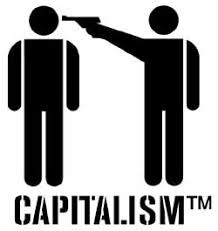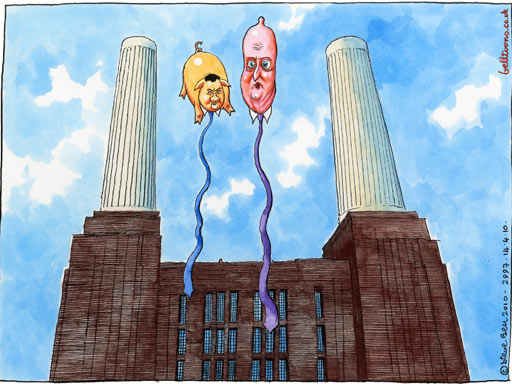Jeremy Corbyn MP, writing in the
Morning StarMonday night's Channel 4 debate between Alistair Darling, Vincent Cable and George Osborne was portrayed as an X Factor competition with the threesome all allowed to give their own broadly similar analysis to the situation facing this country.
An instant opinion poll after the event awarded a 36 per cent victory to Professor of Hindsight Cable with Darling and Osborne tying for second place on 32 per cent.
Rather surprising this, in view of Osborne's peculiar decision to announce that the Conservative government would remove the National Insurance increase and would thus offer up £5.6 billion of "efficiency savings."
Apparently the Tories think they are marching into power on the slogan of efficiency savings, but I would recommend that every public worker be seriously concerned about this because it sounds to me and many more like cuts by another name.
Where all three agreed was that there has to be a repayment of the £167bn deficit and the question was more on the timetable for repayment rather than the principles behind it or of the sort of economy that we should have in the future.
The Tories, as we well know, are a party representing the interests of the very rich and the purpose of Labour ought to be to represent the organised working class and radical people of this country.
For all his analysis of the way the banking crisis came about, Cable essentially offers broadly market solutions to the problem and claims the Lib Dems are neither representatives of the Tory rich or militant "trade unions." Interestingly, the Lib Dems equate a similarity of power and interest between the incredibly rich backers of the Tory Party and trade unions who represent people in work.
This would suggest a complete lack of understanding of the role or rights of trade unions in our society.
The three big industrial disputes at the present time - the BA cabin staff strike, the civil servants' dispute over severance pay arrangements, and the rail workers' defence of signal and safety workers' jobs and conditions.
Even if successful none of these disputes will make any member of any union better off, but they will save jobs and protect conditions.
And all of these actions are defensive. If anyone has any doubts as to what happens when the bankers are allowed to impose a solution on the economic crisis, they only have to look at the latest twists and turns in Greece.
The once highly popular PASOK government in Athens is seeking to obey the diktats of the world's bankers and the European Bank, thus creating more unemployment and a deeper recession.
In turn this will further increase the jobless rate in one of Europe's poorer countries.
The alliance of the European leaders enforcing these measures on Greece and now on Portugal are the result of the creation of an independent central bank dedicated to "market stability," not social justice.
The Morning Star reported the publication for discussion of the
People's Agenda by the Labour Representation Committee, which boldly poses the question in whose interests our economy has to be run.
The pamphlet stresses that despite the increases in pensions, welfare benefits and child allowances the low taxation rate among the richest means that inequality in Britain is probably the highest in Europe.
In its proposals for an incoming government, the point is strongly made that contracting out of public services, marketising education and league tables for schools have forced public services to focus more on cost-cutting than quality.
The pamphlet quite rightly calls for a massive house-building programme and while the government's recognition of the role of council housing in the past two years is welcome - as is the change in local authority finance - a massive problem of those living in overcrowded accommodation remains.
This results in underachieving children and many who have no chance of council housing being forced to live in very expensive private rented accommodation.
It is time to control this absurd market and prevent the exploitation of the vulnerable through extortionate rents.
The
People's Agenda also makes demands for a decent minimum wage, the repeal of anti-trade union laws and the public ownership of crucial industries.
After the election the incoming government will inherit an unprecedented opportunity in the public ownership of most of the banking system.
This should be brought under public control and not left in the hands of a holding company whose sole function is to dispose of the shares at the first opportunity.
Labour was founded by the trade unions and socialists in Britain at the start of the 20th century and its very survival depends on the support of that same coalition.
To win the election, this coalition must be mobilised. Afterwards, the crisis of free market and bankers' Britain must be dealt with by ending the obscenity of inequality and replacing it with the goal of equal opportunities and social justice.




